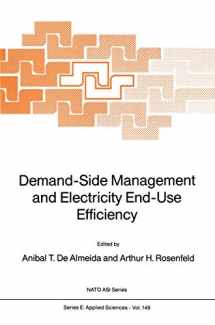
Demand-Side Management and Electricity End-Use Efficiency (NATO Science Series E:, 149)
ISBN-13:
9789401071277
ISBN-10:
9401071276
Edition:
Softcover reprint of the original 1st ed. 1988
Author:
A. de Almeida, Arthur H. Rosenfeld
Publication date:
2011
Publisher:
Springer
Format:
Paperback
658 pages
FREE US shipping
Book details
ISBN-13:
9789401071277
ISBN-10:
9401071276
Edition:
Softcover reprint of the original 1st ed. 1988
Author:
A. de Almeida, Arthur H. Rosenfeld
Publication date:
2011
Publisher:
Springer
Format:
Paperback
658 pages
Summary
Demand-Side Management and Electricity End-Use Efficiency (NATO Science Series E:, 149) (ISBN-13: 9789401071277 and ISBN-10: 9401071276), written by authors
A. de Almeida, Arthur H. Rosenfeld, was published by Springer in 2011.
With an overall rating of 3.6 stars, it's a notable title among other
books. You can easily purchase or rent Demand-Side Management and Electricity End-Use Efficiency (NATO Science Series E:, 149) (Paperback) from BooksRun,
along with many other new and used
books
and textbooks.
And, if you're looking to sell your copy, our current buyback offer is $0.3.
Description
A NATO Advanced Study Institute on "Demand-Side Management and Electricity End-Use Efficiency" was held in order to present and to discuss some of the most recent developments in demand-side electric power management and planning methodologies as well as research progress in relevant end-use technologies. Electricity is assuming an increasingly important role in buildings and industry, due to its flexibility, efficiency of conversion and cleanliness at the point of use. However the production and transmission of electricity requires huge investments and may have undesirable environmental impacts. The recent nuclear accident in Chernobyl and the damage caused by acid precipitation are creating increasing concerns about the impacts of power plants. Some environmental problems are local or regional, others such as global warming can affect the whole world. Although environmental impacts may be minimized with additional investments, electricity generation will become even more capital intensive. Energy, and electricity in particular, is not directly consumed by people. To achieve improved standards of living, what is important is. the level of production of goods and services. If it is possible to produce the same quantity of goods and services with less electricity and in a cost-effective way, substantial benefits can be gained. By reducing costs, electricity efficiency can raise the standards of living and increase the competitiveness of an economy. Electricity efficiency also leads to reduced requirements in power plant operation, thus leading to reduced consumption of primary energy supplies and a higher quality environment.


We would LOVE it if you could help us and other readers by reviewing the book
Book review

Congratulations! We have received your book review.
{user}
{createdAt}
by {truncated_author}


